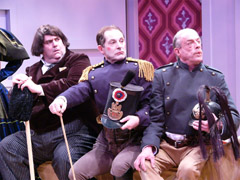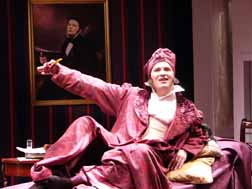
Paulanne Simmons
To Be or Not to Be… Married
 |
| John Tillotson as Omelet, Dominic Cuskern as Zhevakin, and Robert Hock as Anúchkin in The Pearl Theatre Company's production of Gogol's MARRIAGE. Photo by Matthew Shane Coleman |
“Marriage”
Directed by Jesse Berger
Theatre 80
80 St. Mark’s Place at 1st Ave.
Runs in rotating repertory with Moliere’s “The Imaginary Invalid”
No. 13 through Dec. 19
$40, $50
Reviewed by Paulanne Simmons, Nov. 30, 2004
The Pearl Theatre Company may be known for presenting the tried-and-true classics, but that doesn’t mean the company is not willing to take risks. Case in point: Nikolay Gogol’s satirical comedy “Marriage” now onstage at the company’s historic Theatre 80 until Dec. 19.
Marriage was first performed in St. Petersburg in 1942. Gogol’s last play, Marriage was not exactly a hit. As for New York productions, there has only been one in the 160 years since the play premiered. However, Pearl’s excellent production, directed by Jesse Berger, proves this much-neglected masterpiece of irreverent humor deserves better treatment
Subtitled “a completely incredible event in two acts,” Marriage recounts the machinations of the recently married Kochkaryov (the irrepressible Sean McNall) to make sure his friend Podkolyosin (Christopher Moore) is similarly attached.
The young lady Podkolyosin has his eye on, Agafya (the magnificently funny Allison Nichols), has been presented with four suitors, including Podkolyosin, all of whom have been found by the conniving matchmaker Fyokla (Carol Schultz) and all of whom have less than noble motives.
 |
| Christopher Moore as Podkolyósin in The Pearl Theatre Company's production of Gogol's "Marriage." Photo by Matthew Shane Coleman |
Omelet (John Tillotson) is a pompous head clerk, Anuchkin (Robert Hock) is a former infantryman looking for a wife who speaks French, although he can’t speak a word of that language himself and Zhevakin (Dominic Cuskern) is a retired naval lieutenant who can’t understand why such a desirable bachelor as himself keeps getting refused.
With Sam Fleming’s sumptuous costumes and Takeshi Kata’s set reproducing a 19th century St. Petersburg apartment, Marriage faithfully recalls Russia in pre-revolutionary times. Even better, the production is delightfully true to the spirit of Russian comedy – whose favorite subject is the Russian character itself.
In Marriage, Gogol lampoons the materialistic, status-obsessed suitors, the susceptibility of Russian social climbers to everything non-Russian and the manipulations of matchmakers who reduce marriage to the contract and its accompanying fees.
Berger has allowed the physicality of Gogol’s humor to flow naturally from the dialogue. The characters cavort as ridiculously as they converse.
Nichols, with her mobile features and perfect timing, reigns supreme in this comedy, as she vacillates between her several suitors, at one point claiming she is in love even as she attempts to choose a husband by picking a name out of her purse. But each of her suitors has his moment of comic triumph.
During World War II, the inmates of the Nazi concentration camp Terezin in German-occupied Czechoslovakia staged Marriage in the attic of a barrack. One suspects these prisoners chose Marriage not only for its comic qualities.
Despite Gogol’s professed conservatism, there is something innately subversive in his work, which no matter how fantastic, always has an element of realism that calls for reform. Gogol takes a long look at mankind and finds it lacking. As the Yiddish proverb tells us: What soap is to the body, laughter is to the soul. [Simmons]

| museums | NYTW mail | recordings | coupons | publications | classified |